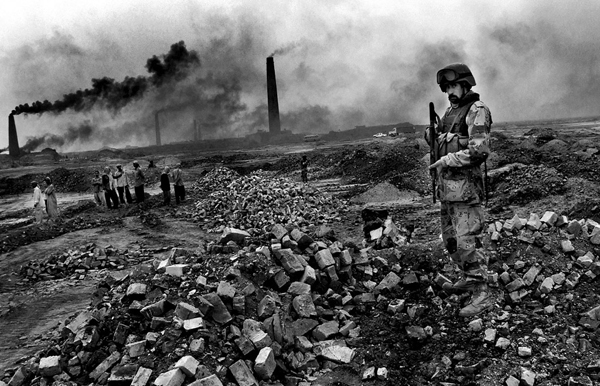Imagine some of the Twitter conversations that might have started just minutes after Secretary of State Colin Powell's infamous UN speech about Iraq's alleged weapons of mass destruction program back in 2003:
@RobertMcNamara: Another Gulf of Tonkin? Are we about to get into another war on false pretenses?
@profAlMarashi: Um, did SecyState #ColinPowell just plagiarize one of my papers?
@WMDinspectordude: Where does #USA get its info on #UK intel? Not from me!
Of course, in the months leading up to the invasion of Iraq, Twitter was still three years from being invented, and the voices calling out Powell and the U.S. government were largely marginalized.
People like former Defense Secretary Robert McNamara, who saw stark parallels between the war he helped get the U.S. into and the one we were about to launch, had few platforms for leading a national conversation, and couldn't get his voice through the filter of mainstream media.
It took Britain's Channel 4 to show that the U.K. government report quoted by Powell was cribbed right from a paper by professor Ibrahim al-Marashi.
And it wasn't until David Kelly committed suicide that the world found out the eminent former weapons inspector told the British government the alleged mobile bioweapons lab Powell spoke about was simply a hydrogen gas generator for filling balloons.
Operation Iraqi Freedom was the last U.S.-led war before the age of social media, when the public was still largely reliant on the mainstream press for information and punditry. While a few voices within the media were reporting on concerns about the impending invasion, they were often buried deep inside newspapers, or relegated to the pages of liberal magazines like Mother Jones and The Nation.
According to Sree Sreenivasan, a leading expert on social media at Columbia University, the quiet voices of dissent a decade ago would have had a bullhorn if Twitter had been around in 2003. He says publications like "The Nation... (and) Mother Jones punch above their weight on social media." And he says those mainstream media stories buried near the obits in the back of the paper would have found a hungry audience on Twitter, Facebook and Tumblr, since "where your story is, is no longer as important as what your story is."
Blogging from the rubble
One of the few voices coming out of Iraq back in 2003 was from a young dentist in Baghdad named Zeyad Kasim, who started a blog called "Healing Iraq." He shared with his several thousand online readers his hatred of Saddam, and his hopes for a democratic Iraq. But he told me he was most interested in what Americans had to say, so he did something radical at time -- he opened up the comments section on his blog and solicited his readers' opinions. It was a sort of proto-social media platform, which allowed the public to engage with one another in an open space, and fostered vibrant discussions about the impending invasion.
"I started a conversation with Americans," Kasim told me. "It was a way to directly engage the American audience."
What Kasim learned that there was ambivalence within certain circles, but that ambivalence was not being reflected on cable news or in newspapers.
One big change today is that editors in mainstream newsrooms take cues from what's trending in social media, and they move quickly on stories guided by the wisdom of the crowd.
Antidote to misread mood
Before the invasion, Bush Administration officials assured the public that the different factions within Iraq would come together in opposition to Saddam -- and in support of the "liberators." But imagine what a tweet like this 10 years ago, from the Shiite leader Muqtada al Sadr, might have done to that conversation:
@MuqtadaDaMan: Can't wait for my #Shia brothers to unleash bloodbath of #Sunni and #Baath after #Saddam is toppled!
In the months after Saddam fell, Sadr did just that. With a single sermon, the young cleric could command a hundred thousand young men to rally in the streets, and he led two successful insurgencies that destabilized Iraq for months. Think of what he could have done with a megaphone like Twitter.
All you have to do is look to Iraq's neighbours to see what a difference a decade makes. Mobile photos and social media helped lead to the toppling of governments in Tunisia, Egypt, Libya and Yemen, continue to flame a smoldering civil war in Syria, and just led to riots in Jordan.
Still, neither Sreenivasan nor Kasim think a vibrant social media scene in 2003 could have silenced the drumbeat for war, but I'm not so sure. As a national security reporter, I remember how difficult it was 10 years ago to get stories on the air that went against the public narratives about terrorism and Saddam. We were like lone soldiers on the front lines, with no one to cover your back.
Today, though, Twitter offers you an army of voices to back you up. I'd like to think that the journalists and experts who were largely silenced a decade ago would have had a platform on social media, and could have cut through the rumbles of war. ![]()
Read more: Rights + Justice, Politics, Federal Politics, Media
















Tyee Commenting Guidelines
Comments that violate guidelines risk being deleted, and violations may result in a temporary or permanent user ban. Maintain the spirit of good conversation to stay in the discussion.
*Please note The Tyee is not a forum for spreading misinformation about COVID-19, denying its existence or minimizing its risk to public health.
Do:
Do not: